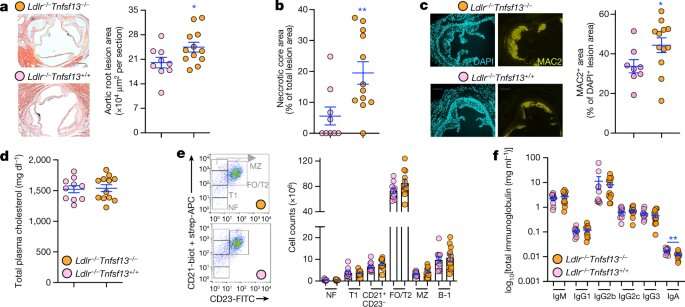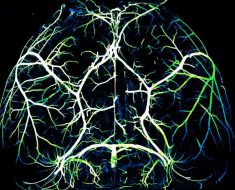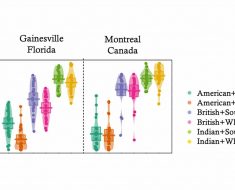
Heart attacks and strokes are the main causes of death and loss of productive years globally. These clinical complications are caused by atherosclerosis, which is a chronic disease that leads to the accumulation of LDL cholesterol and immune cells in the inner layer of arteries and thereby resulting in the build-up of atherosclerotic plaques. Researchers from the Department of Laboratory Medicine of the Medical University of Vienna in collaboration with colleagues from the University of Lausanne (Switzerland) and the University of Cambridge (UK) have identified that a cytokine called A Proliferation Inducing Ligand (APRIL) plays a major protective role against the formation of atherosclerotic plaques. The study was now published in the prestigious journal Nature.
The investigators found that genetically engineered mice that do not express APRIL developed more atherosclerosis. They further confirmed this discovery by injecting mice with neutralizing antibodies against APRIL, which also lead to the development of bigger atherosclerotic plaques. APRIL binds immune receptors that are predominately expressed by B lymphocytes and thereby regulates antibody production and the survival of antibody-producing cells. Because of these properties, APRIL is being explored as a therapeutic target in autoimmune diseases. “We initially hypothesized that the protective properties of APRIL against atherosclerotic plaque formation are mediated via its ability to regulate B lymphocyte responses that play a crucial role in atherosclerosis. However, this hypothesis was wrong. We then focused on an unappreciated non-immunological property of APRIL that is its ability to bind to proteoglycans,” says Dimitrios Tsiantoulas, Research group leader at the Department of Laboratory Medicine of the Medical University of Vienna and lead author of the study.
The authors demonstrated that APRIL is produced in high amounts directly inside the arteries where it binds to the proteoglycan Perlecan (or heparan sulfate proteoglycan 2), which is a large molecule that decorates the inner layer of arteries. The investigators showed that administration of neutralizing antibodies against APRIL in mice that express a genetically engineered form of Perlecan, which APRIL cannot bind, had no effect on atherosclerotic plaque development.
“These data clearly show that the protective properties of APRIL in atherosclerosis are mediated by its ability to bind to proteoglycans in arteries” says Christoph Binder, Professor of Atherosclerosis Research at the Department of Laboratory Medicine of the Medical University of Vienna and senior author of the study. Perlecan has previously been shown to promote the retention of LDL cholesterol, which according to the present study can be mitigated by APRIL. Furthermore, the authors identified a specific anti-APRIL antibody that enhances the binding of APRIL to proteoglycans and reduced atherosclerosis in mice. “The development of therapeutics that increase the binding of APRIL to proteoglycans could be a new line of treatment for atherosclerotic disease,” says Dimitrios Tsiantoulas.
Source: Read Full Article





